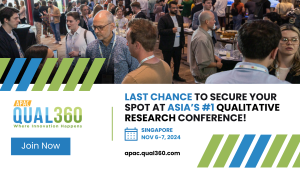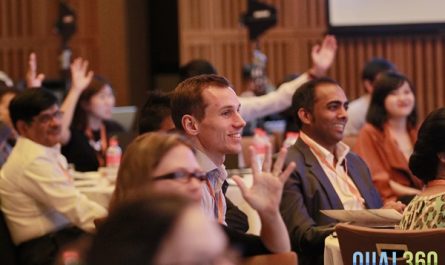How Qualitative Research Identifies Jobs to Be Done: A Sneak Peek into Sanofi’s Session at QUAL360 Asia
Speaker Interview with Percival Pastrana, AMEA Consumer Science Lead, Sanofi Consumer Healthcare
In the lead-up to Qual360 Asia, we spoke with Percival Pastana about his upcoming presentation and what motivated him to participate in the conference.

Val is the Consumer Science Lead for AMEA/Global at Sanofi Consumer Healthcare, where he drives growth for key brands through consumer-inspired, science-backed innovations. He also founded Next Level Innovation, a coaching agency focused on innovation best practices. With experience in R&D, insights, and innovation at companies like Mondelez, P&G, Unilever, and Samsung, Val is a seasoned expert in innovation and design thinking across various sectors. Passionate about team development, he dedicates time to coaching teams in delivering breakthrough results.
QUAL360: Without giving too much away – what is the core message of your talk and what would you like delegates to remember?
Val: As the industry is beginning to realize, there is a lot of hype around AI. I will be sharing my own experience in experimenting with different AI tools, testing varying degrees of human intervention, and where the real value in AI implementation in deep human insights research lies. The case study I will share showcases a perfect storm of no resources, no budget but high strategic importance. And absolutely needed yesterday. AI tools are obvious enablers but also come with a lot of precautions – especially if the business challenge requires deep consumer empathy and identification of Jobs to be Done.
I had chosen to delve deeper into Jobs to be Done as this is a huge area of opportunity in consumer research. As an industry, we have become so good at the validation of ideas, that the art of deep human connection and understanding of growth-driving needs and aspirations is gradually becoming a lost craft.
At the end of my talk, I aim to share lessons and provoke discussions on how AI can augment human intuition to rebuild our muscles in identifying Jobs to be done, and address the organizational barriers disincentivizing rigour and depth in the first place.
QUAL360: What motivates you to join the Qual360 APAC conference and what are your expectations?
Val: Firstly, I believe in the critical role of qualitative research in its many forms, classical or tech-enabled, in developing deep, differentiated, and business-growing human insights. I’m especially thankful that Qual360 continues to advocate that, and provides a forum for all like-minded practitioners and leaders in the insights discipline, to share challenges, experiments, and valuable lessons. I’m especially excited about seeing new approaches to address the perceived limitations of quals, i.e. poor reach, expensive, time-consuming, and more art than science, from my peers in other companies, and agency partners who are pushing the boundaries of what quals can do for our brands.
I have been a regular attendee, speaker and panellist of the conference for the last 3 years. It remains a fixture in my calendar as an opportunity to give back to the insights community and keep in touch with all the new developments in qual research.
QUAL360: Where do you see qualitative research today and where do you see the industry overall heading?
Val: I am a strong proponent of ensuring that quals get a fair share of research budgets, not just as a disaster check, but more crucially, as a tool to understand how we can develop meaningful, dare I say life-changing, solutions to the consumers that we serve. Unfortunately, it’s losing its relevance in many boardroom discussions. Where it is used, it is underleveraged, if not wrongly applied.
There is a lot of upside for us to redefine the value-proposition of quals within the industry. I see that movement already happening with all the new tools and approaches. I’m excited to see more use cases of qual research combining human connection, instinct and creativity with the scale and efficiency that technology enables.
QUAL360: What do you consider to be the 3 essential elements of the qualitative research toolkit today?
Val: In the book “The Innovator’s DNA,” Dyer, Gregersen and Christensen outlined 5 skills of successful innovators: associating, questioning, observing, networking, and experimenting. I would focus on these attributes, rather than specific tools, as I feel they are key to expanding our thinking of what an effective and impactful qual toolkit should be. I won’t spoil the book and just illustrate my point with 3 of my favourites:
Associating is about making surprising, oftentimes, not obvious connections across various pieces of information. In qual, in particular, it’s ensuring that they are designed in a way that context is not forgotten. What we hear or see should not be taken at face value and always triangulated with their context, other data points and other relevant knowledge. For example, apart from doing knowledge rewinds and hypothesis building, we normally talk to various types of experts, chefs, moms, friends and kids to build a full picture of unfulfilled jobs to be done.
Observation is about closely, carefully and intentionally looking for small details in what people do to gain insights on pains and gains that they are not even aware of. These problems are so entrenched that it will make a world of difference to them when solved. With my teams, I always encourage them to prioritize behavioural observations, ethnographic research, systems 1 approach, derived drivers vs claimed preferences, and immersing themselves in the contexts where problems are experienced and products are used.
Finally, experimenting, that is creating prototypes and co-creating with consumers to unlock new insights. We had played around with AR/VR/XR approaches, AI visualizers, and even rapid prototyping labs to immerse consumers to different experiences that helped us develop a blueprint for ideal products.
QUAL360: Apart from work, what should delegates talk to you about at Qual360 APAC? Do you have any particular personal interests, hobbies or extracurricular activities and engagements?
Val: I am passionate about Ikigai, giving back and coaching the next generation. The lasting friendships I developed from attending such conferences are all marked by our shared passion for (1) codifying and sharing our decades of experience in the field through talks, articles and even hopefully books someday, (2) coaching our peers from smaller companies and mission-driven organizations through active participation in industry groups, and (3) working with schools to begin embedding the skills and tools as early as possible as they are transferable to any industry. I would love to get connected to those who can connect me to opportunities for me to do any of these.
Join the 𝗼𝗻𝗹𝘆 𝗰𝗼𝗻𝗳𝗲𝗿𝗲𝗻𝗰𝗲 𝗰𝗮𝘁𝗲𝗿𝗶𝗻𝗴 𝘁𝗼 𝗾𝘂𝗮𝗹𝗶𝘁𝗮𝘁𝗶𝘃𝗲 𝗺𝗮𝗿𝗸𝗲𝘁 𝗿𝗲𝘀𝗲𝗮𝗿𝗰𝗵 𝗶𝗻 𝗔𝘀𝗶𝗮 on 𝗡𝗼𝘃 𝟲&𝟳 in 𝗦𝗶𝗻𝗴𝗮𝗽𝗼𝗿𝗲– and 𝗯𝗲𝗰𝗼𝗺𝗲 𝗽𝗮𝗿𝘁 of the 𝗴𝗹𝗼𝗯𝗮𝗹 𝗤𝘂𝗮𝗹𝟯𝟲𝟬 𝗰𝗼𝗺𝗺𝘂𝗻𝗶𝘁𝘆! Companies attending Flipkart, Standard Chartered, Universal Robina, Meta, Mondelez, HP, Shiseido, Spotify and many more!
With overwhelming demand, tickets are almost gone, and we’re closing sales soon. Secure your spot today- use promo code “LAST10” for a 10% discount.










 by
by 


